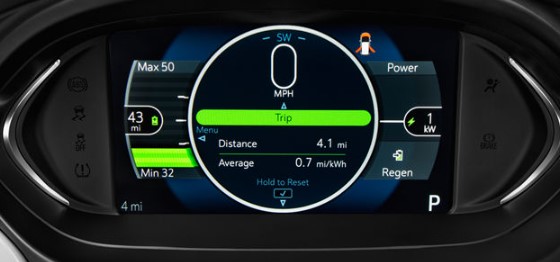Chevy Bolt warning lights are one of the most common features on cars and SUV’s. They help drivers stay safe by letting them know about potential problems. But what about the Chevy Bolt? What are the warning lights for, and what do they mean? This article will explore Chevy Bolt warning lights and their meanings. We’ll also provide some tips on troubleshooting them if they come on in your car.
👀Look at this:
Is Chevy Bolt a Reliable Car?
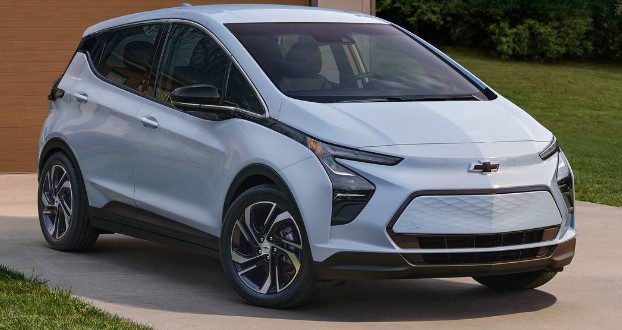
The Chevy Bolt is a reliable car with much to offer its drivers. It is affordable, efficient, and easy to drive. It also has a comfortable interior and plenty of trunk space. The only downside to the Chevy Bolt is that it does not have a lot of horsepower under the hood. However, this is not necessarily bad, as the Chevy Bolt is still a very capable and reliable car.
Recommended article:
Chevy Bolt Warning Lights and Color Descriptions
The Chevy Bolt has a variety of warning lights that come on when something is wrong with the car. Here are some of the most common warning lights and their color descriptions:
- Red: This indicates a serious problem that needs to be addressed immediately.
- Amber: This means a potential issue needs to be monitored.
- Green: Green usually indicates that a system is operating as it should.

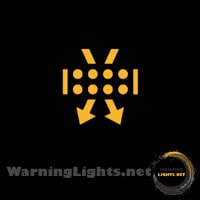 |
Chevy Bolt Engine Air Filter Warning LightIf your Chevy Bolt has an engine air filter warning light on, it means the filter needs to be replaced. The warning light comes on when the filter is dirty or if it’s not properly installed. |
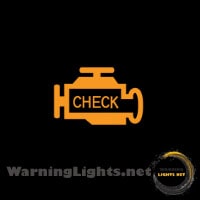 |
Chevy Bolt Engine Check Warning LightIf your Chevy Bolt’s engine check warning light is on, it means that there is a problem with the vehicle’s emission control system. The light will usually come on when the car starts and then go off after a few minutes. If the light stays on, the system is not working properly and needs to be checked by a mechanic. |
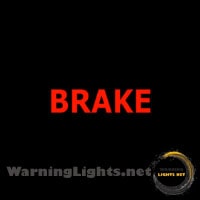 |
Chevy Bolt Brake Warning LightIf you experience a warning light on your Chevy Bolt dashboard related to the brake system, don’t panic. In most cases, this means that there is an issue with one or more of the car’s brakes, and needs to be fixed as soon as possible. |
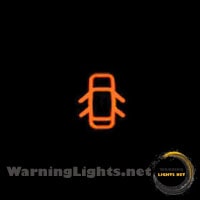 |
Chevy Bolt Door Open Warning LightThe Chevrolet Bolt has an open door warning light that indicates that the door is open. The warning light will stay on until the door is closed. This can be a safety hazard if you’re unaware of it and someone walks into traffic. |
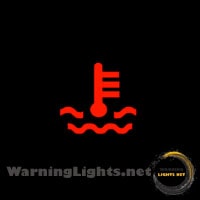 |
Chevy Bolt Coolant Temperature Warning LightThe Chevy Bolt has a coolant temperature warning light that will come on when the vehicle’s coolant reaches a certain temperature. The warning light will stay on until the coolant temperature is below the set point or the engine is turned off. If you experience a warning light coming on, it is important to take action to lower the coolant temperature. |
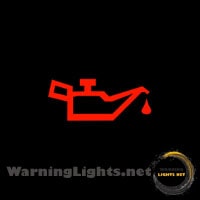 |
Chevy Bolt Engine Oil Pressure Warning LightThe Chevy Bolt’s engine oil pressure warning light signals when the oil pressure falls below a certain level. This could indicate an issue with the engine and should be checked by a mechanic. If the oil pressure is too low, it could prevent the engine from starting. The oil pressure warning light can also stay on even if the engine is working properly, indicating an underlying problem. |
 |
Chevy Bolt Air Bag Warning LightIf you’re concerned about the Chevy Bolt airbag warning light, rest easy — it’s not a sign that your car is in danger. In fact, according to GM, the light only comes on if there’s a problem with one of the airbags. If you see the warning light come on, don’t panic. Instead, visit your local Chevrolet dealership and have them take a look at your car. |
 |
Chevy Bolt All-Wheel Drive System(AWD) Indicator LightThe Chevrolet Bolt all-wheel drive system (AWD) indicator light tells you when the system is working properly. The Chevy Bolt’s all-wheel drive is engaged if the light is on. If the light is off, the system is not working. |
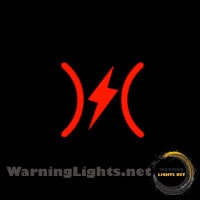 |
Chevy Bolt Electronic Throttle Control Warning LightThe Chevrolet Bolt has several warning lights indicating potential problems with the car’s electronics. Some of the most common warning lights for the Bolt include the throttle control warning light, power steering warning light, and check engine light. When any of these warning lights turn on, a problem with one of the car’s electronic systems needs to be fixed as soon as possible. |
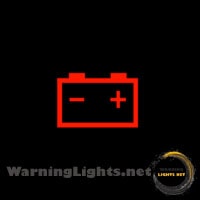 |
Chevy Bolt Battery Charge Warning LightIf you’re experiencing a Chevy Bolt battery charge warning light, there’s probably not much you can do to fix the issue. Owing to the car’s unique design, many owners have found that the light indicates that the battery is low on power and needs to be charged soon. The good news is that charging your Chevy Bolt battery won’t take long – most models can be recharged within around three hours using a standard AC outlet. If you’re concerned about your car’s battery life, it’s best to contact your Chevy dealer or Chevrolet service center to estimate how much power the battery still has left. |
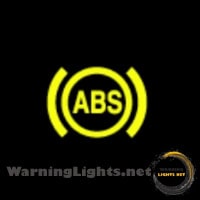 |
Chevy Bolt Abs Warning LightIf you’re having trouble starting your Chevy Bolt, the first thing to check is the Abs Warning light. This light comes on when the car’s electronic stability control system detects a problem with the driving dynamics. This might sometimes mean something wrong with the suspension or steering. If you see this warning light, it’s important to take action and have the problem fixed as soon as possible. |
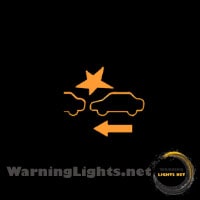 |
Chevy Bolt Forward Collision (FCW) Warning LightIf your Chevrolet Bolt has the Forward Collision Warning light on, the car detects an object in the vehicle’s path and warns you about it. This system is meant to help prevent accidents, but it can also be annoying if it comes on a lot. Follow these steps to turn off the FCW light:
|
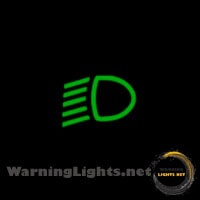 |
Chevy Bolt Dipped Head Warning LightThe Chevrolet Bolt Dipped Head Warning Light is designed to help prevent drivers from accidentally leaving their headlights on when exiting their vehicles. The light will illuminate if the driver’s door opens while the headlights remain on. |
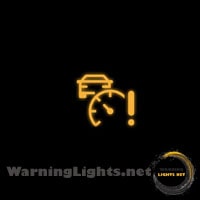 |
Chevy Bolt Cruise Control Malfunction Warning LightIf you’re ever driving your Chevrolet Bolt and experiencing a cruise control malfunction warning light, it’s important to take action. This light will typically illuminate when the car’s cruise control system becomes inoperable. If you experience this warning light, don’t panic – there are steps you can take to address the issue and keep your car safe. If you notice that the Cruise Control Malfunction Warning Light is on, try resetting the system by pressing and holding the brake pedal until the instrument cluster indicator lights up white, then release the pedal. If that doesn’t work, disconnecting and reconnecting the battery cables may also help reset the system. If neither of these methods works, there are a few things you can do to avoid accidents while driving with a broken cruise control: refrain from accelerating quickly or braking abruptly; maintain a safe following distance; use your car’s Intelligent Speed Assist function if available; and drive during daylight hours when visibility is better. |
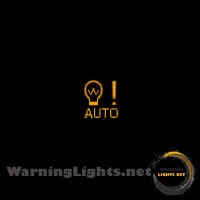 |
Chevy Bolt Dusk Sensor Warning LightThe Chevrolet Bolt has several warning lights that may come on while driving. One of these is the Dusk Sensor Warning Light. This light comes on when the sensor detects low light levels in the area surrounding the car. This could be because of a cloud cover or other obstruction, so checking the light every time you get in your car is important to ensure it’s not coming on. If it is, you can disable the warning by pressing down on the gear selector stalk and turning off the light. |
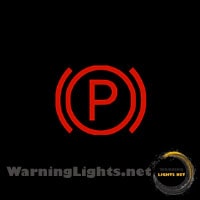 |
Chevy Bolt Electric Parking Brake Warning LightThe Chevy Bolt has a new electric parking brake warning light that will come on when the car is stopped with the parking brake engaged. This warning light will let you know that the parking brake is engaged and help keep your car from rolling away if you forget to release the parking brake. This new warning light is on the instrument panel above the steering wheel. To turn it off, press and hold the button for three seconds. |
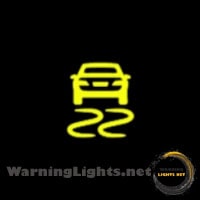 |
Chevy Bolt Electronic Stability Control Active Warning LightThe Chevrolet Bolt has been around for quite some time now, and with that comes several features that set it apart from other vehicles on the market. One of these features is the electronic stability control (ESC) active warning light. The ESC active warning light is a system that helps warn drivers when the car is going out of balance, which can lead to accidents. When the ESC active warning light turns on, it will illuminate red and flash until the driver takes corrective action. In addition to providing a visual warning, the ESC active warning light will also sound an alarm if it stays lit for over 30 seconds. If you ever experience an issue with your Chevy Bolt’s ESC, be sure to take it to your local dealership for inspection so that they can ensure that everything is in working order. |
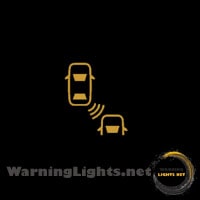 |
Chevy Bolt Blind Spot Indicator Warning LightThe Chevy Bolt has a blind spot indicator warning light designed to help drivers see around the vehicle in their blind spots. The warning light will flash when someone or something is in the driver’s blind spot. This is a useful safety feature for the Chevy Bolt and can help keep drivers safe. |
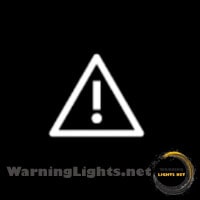 |
Chevy Bolt General Central Indicator LightThis GCIL tells you when there is an issue with one of the vehicle’s systems, and it is important to know how to use it to keep your Bolt safe. For example, when there is an issue with the battery, the GCIL will turn on and stay on until you either fix the problem or reach your destination. In addition, if there is an issue with one of the other systems, like sensors or the brakes, the GCIL will also light up. Not all issues will cause the GCIL to light up, so it is important to know what those issues are to avoid them. For instance, if you have brake issues but no sensor problems, then chances are you don’t need to worry about the GCIL being triggered. However, if multiple issues are going on at once,, it might be wise to take action before reaching your destination just in case something goes wrong. |
What problems does the Chevy Bolt Have?
The Chevy Bolt has been met with a lot of criticism since its release because of the numerous problems that have been reported with it. Some problems include electrical issues, faulty batteries, and poor performance. One common issue reported is that the Bolt’s battery will randomly lose power and require a jump start.
One major problem with the Bolt is that it has received many complaints about its electrical system. Many people have said that their cars have had issues with their battery and charging systems. There have also been reports of car fires associated with these issues.
The Chevy Bolt also has some other major flaws. For example, it has received a lot of criticism for how poorly it performs compared to other cars on the market. Additionally, there are many complaints about how cheaply the car was made.
If you’re having problems with your Chevy Bolt warning lights, there is a good chance you don’t have the correct parts or follow GM’s instructions correctly. This article will discuss some of the most common warning lights and what might be causing them. We will also provide instructions on how to fix them if they’re not working properly. Finally, we’ll offer some tips on keeping your Chevy Bolt running smoothly so that you can avoid any future issues. Thanks for reading!
🎯Suggested article:
FAQs About Chevy Bolt Warning Lights
Are they discontinuing the Chevy Bolt?
Sources close to the matter have confirmed that the 2023 Chevrolet Bolt EV and Bolt EUV production will end on November 7th, 2023, at General Motors’ Lake Orion plant in Michigan. Production of these vehicles began in July 2022, which means they are being manufactured over 16 months. This indicates General Motors’s commitment to providing their customers with reliable products built with efficiency and quality.
Why are Chevy Bolts not selling?
GM faced a challenging situation last summer when it had to issue a stop-sale on the Bolt as part of a global recall due to defective batteries that posed a fire risk. The company took corrective measures and stopped building new Bolts late last year to focus solely on repairing the affected 2017-22 model vehicles. GM is committed to ensuring its products are safe for customers and stands behind any necessary recalls or repairs, no matter the inconvenience.
What are the problems with Chevy Bolt?
Bradley Berman, a writer for Autoweek, recently leased a 2017 Bolt for three years and experienced various issues with the car’s airbag, lane departure warning system, suspension, tires, vehicle speed control, and battery functions. Furthermore, Mr. Berman was not alone in his experiences, as these problems have been seen in many other electric vehicles today.
Is the Chevy Bolt a reliable car?
The 2023 Bolt is expected to be much less reliable than the average new car, based on data from 2020 and 2021 models. This prediction is due, in part, to customer feedback and reports that an increasing number of vehicles have had issues with their performance. The manufacturer is working to improve reliability in future models by investing in more advanced technologies and materials.
What are the most common problems with a Chevy Bolt?
The National Highway Traffic Safety Administration (NHTSA) has received numerous complaints from vehicle owners regarding electrical and propulsion system issues with the 2022 Chevrolet Bolt EV. The most common problems include those related to the electrical system, faulty battery recall, propulsion system problems, and airbag issues. NHTSA encourages all vehicle owners to contact their local service station for any repairs or replacement parts needed to ensure the proper functioning of their vehicles.
What is the battery warning light on the Chevy Bolt?
If the 2023 Chevy Bolt EV battery warning light turns on while driving, turning off any accessories as soon as possible is important to avoid further battery draining. This warning typically indicates an issue with the alternator, leaving the vehicle running solely on battery power.
Which Chevy bolts are being recalled?
GM issued a recall in 2021 after reports of some Bolts’ high-voltage batteries catching fire. All pre-existing Bolts with LG battery packs were subjected to the replacement process to address the issue. This encompassed 2017-2022 Chevy Bolt models. Further information regarding this recall can be found here in our Bolt Recall Guide.
What is the battery issue on the 2023 Chevy Bolt?
This service update affects the 2023 Chevy Bolt EV and EUV, with two reports of mislabeled high-voltage batteries. The first (N232404821) requires a software update to correct the battery information, while the second (N232404820) necessitates an additional calibration for the vehicle to match the battery chemistry. It is strongly recommended that owners of these vehicles review both updates to ensure they are up-to-date and correctly labeled.
